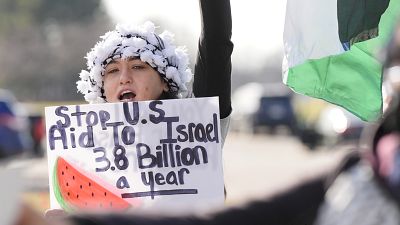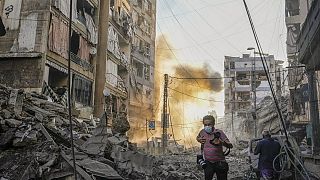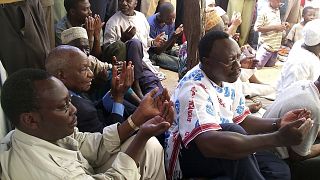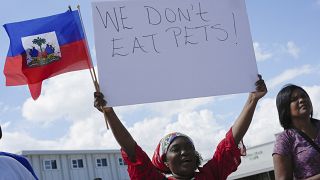USA
Oxfam and Human Rights Watch submitted on Tuesday (Mar. 19) a joint memorandum to the US government regarding Israel’s violations of international humanitarian law including with US weapons and the blocking of US-funded humanitarian assistance.
The groups compiled evidence of "Israel's violations of international humanitarian law in Gaza," and hence "undermining credibility of assurances" it has abided by the rules of the US NSM-20 arms policy.
The release comes as Israel is to submit fresh assurances to the US on its use of weapons provided by Washinton.
What is the NSM-20 arms policy?
National Security Memorandum-20 or NSM-20 establishes that foreign security partners submit assurances to the US Departments of State and Defense that they are not arbitrarily blocking US humanitarian assistance and not violating international humanitarian law. The secretaries of state and defense then need to determine whether these assurances are credible.
“Given ongoing hostilities in Gaza, the Israeli government’s assurances to the Biden administration that it is meeting US legal requirements are not credible,” Sarah Yager, the Washington director at Human Rights Watch said.
The Oxfam-Human Rights Watch memorandum summarizes a wide range of Israeli violations of international humanitarian law, deprivation of services critical to the survival of the civilian population, and arbitrary denial and restrictions of humanitarian aid since the Hamas-led attacks on Israel on October 7, 2023 that killed about 1,200 people.
Which violations of international law have been documented?
Use of US-supplied white phosphorus in military operations in Lebanon and Gaza in October;
Indiscriminate or disproportionate strikes on or near several major hospitals between October 7 and November 7, as well as a strike on a marked ambulance that reportedly killed 15 people and injured 60;
Systematic blocking of assistance, including aid substantially provided by the US, from reaching about 300,000 Palestinians remaining in northern Gaza.
The submission by Hyman Rights Watch and Oxfam is released "as famine is imminent in northern Gaza and a high risk for the rest of the strip if Israel persists in its hostilities and restriction of humanitarian access".
UN experts warned on February 23rd, that "any transfer of weapons or ammunition to Israel that would be used in Gaza is likely to violate international humanitarian law".
At the time, the experts welcomed the suspension of arms transfers to Israel by Belgium, Italy, Spain, the Netherlands and the Japanese company Itochu Corporation.
Israel's defence partners
Israel has gone from being a net weapons importer to the world’s 10th-largest arms exporter according to the Conversation.
However, Israel also imports weapons. The Stockholm International Peace Research Institute’s arms transfers database, show that most of weapons supplied to Israel between 2013 to 2022 came from the U.S. Germany comes second, followed by Italy.
According to Terrence Guay who is the director of the Center for Global Business Studies (CGBS), Israeli imports are funded in part by $3.3 billion of military aid provided annually by the U.S., along with $500 million for missile defense cooperation.
Under president Barack Obama, the US and Israel signed a memorandum of understanding. The Obama administration made the largest single pledge of military assistance in U.S. history. The total value of the MOU which covers FY2019- FY2028, is $38 billion ($3.8 billion per year).
What next?
The US are to review Israeli assurances it is not violating international law. Israel is resuired to send written assurance by Sunday (Mar. 24).
Oxfam and Human Rights Watch urged the US Secretary of State Antony Blinken and Defense Secretary Lloyd Austin to consider expected future violations when determining the credibility of the Israeli government’s assurances.
The groups said they "believe a suspension of arms transfers to Israel is necessary so long as there is an overriding risk that they are being used to commit or facilitate serious violations of international humanitarian and human rights law, and US law and policy."
In January, a dozen of international humanitarian and human rights organizations called for a halt to the transfer of weapons, parts, and ammunition to Israel and Palestinian armed groups where there is a risk that they will be used to commit or facilitate serious violations of international humanitarian or human rights law.
In a symbolic move Monday (Mar. 18), Canada's House of Commons passed a motion that called on Canada to cease future arms exports to Israel.












01:35
US Envoy: No political will to end Sudan's war
01:30
Gaza war: What's next after new US veto on ceasefire draft resolution?
Go to video
US vetoes UN resolution demanding a cease-fire in Gaza for 4th time
Go to video
Africa's mixed hopes for Trump's second term
01:45
UNRWA says nowhere is safe in Gaza, calls for hospitals, schools to be protected
01:07
Yale University to offer course on Beyoncé next year